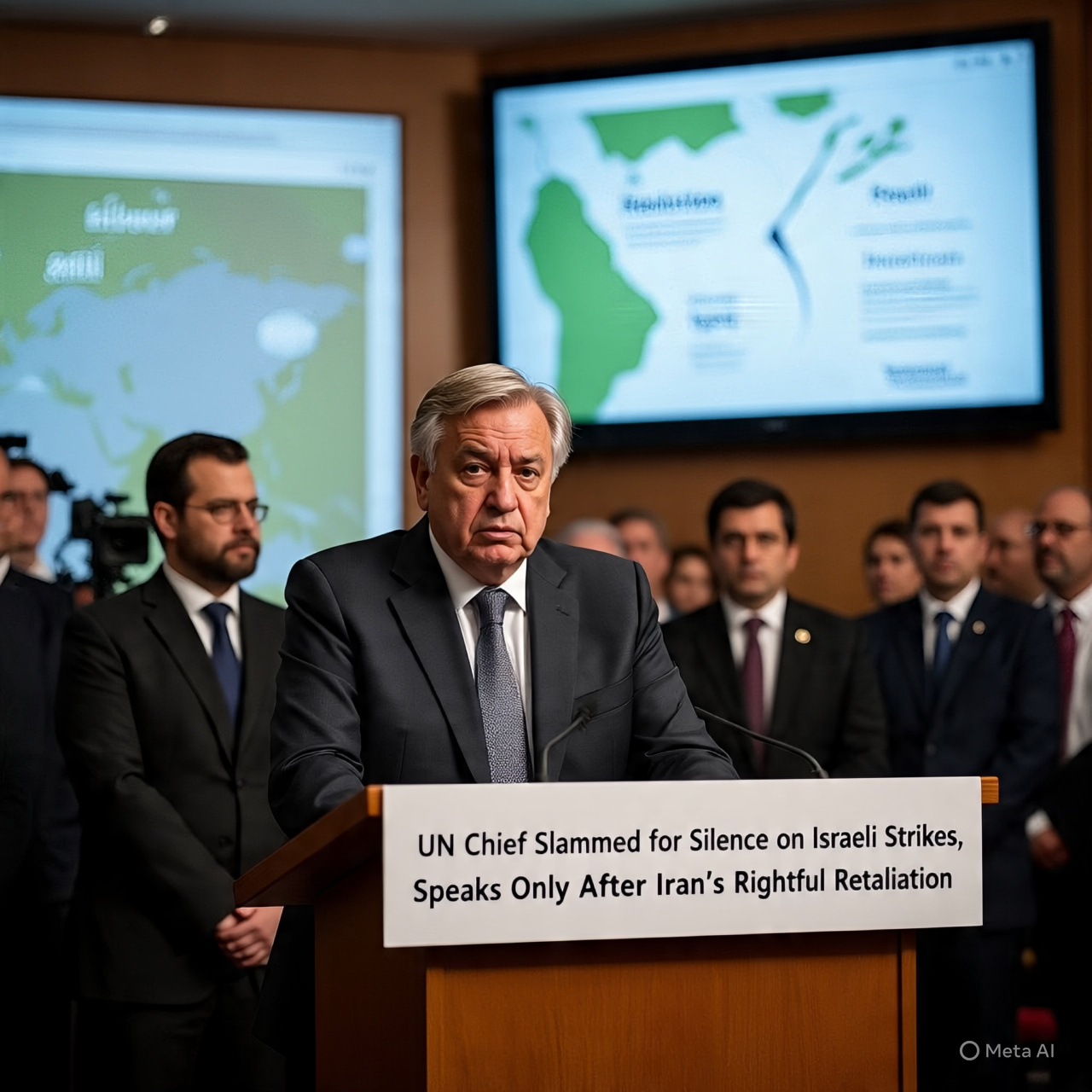FnF News
🇺🇳 FNF News | Global Diplomacy & Conflict Watch
Published: June 14, 2025
By: Khadija Khan, Senior Foreign Affairs Correspondent
“Too Little, Too Late”: UN Secretary-General Faces Backlash for Delayed Response to Israeli Strikes on Iran
New York / Tehran / Geneva — As the Middle East teeters on the edge of all-out war, United Nations Secretary-General António Guterres is facing rare and sharp rebukes from across the Global South and parts of the international legal community. Critics allege that the UN chief’s response to the dangerous escalation between Israel and Iran was not only delayed—but strategically selective, raising questions about neutrality, global double standards, and the erosion of multilateral trust in the UN system.
“Honourable SG, your statement came very late,” said Iranian UN Ambassador Amir Saeed Iravani during a press briefing. “You did not show reaction on the first day of escalation, when many countries condemned Israeli strikes. You spoke only when Iran exercised its right of self-defence, in accordance with the UN Charter. That is a tragedy.”
Background: A Timeline of Escalation
- April 1, 2025: An Israeli airstrike hits the Iranian consulate in Damascus, killing seven IRGC officers, including two senior commanders. Iran declares the strike a “flagrant violation of international law.”
- April 2–10: Dozens of countries, including Brazil, South Africa, Indonesia, China, Turkey, and even some EU officials, condemn the Israeli strike and call for restraint.
- April 13: Iran responds by launching over 300 drones and missiles toward Israeli military facilities, citing Article 51 of the UN Charter—self-defence.
- April 14: UN Secretary-General António Guterres issues a public statement “urging all parties to de-escalate.” Notably, his condemnation focuses primarily on Iran’s retaliation.
Muted on Israel, Vocal on Iran?
The delay and tone of Guterres’s statement did not go unnoticed. Social media erupted with posts accusing the UN of “institutional bias” and “selective morality.” Iranian and Arab commentators questioned why the Secretary-General failed to immediately address Israel’s initial violation of diplomatic immunity under the Vienna Convention.
“When a nation bombs a consulate—a sovereign diplomatic building—and the UN hesitates to call it out, that’s not neutrality. That’s complicity,” tweeted Mohammad Marandi, Iranian-American professor and political analyst.
In contrast, after Iran’s April 13 drone barrage, Guterres swiftly called on Tehran to “exercise restraint” and warned that the region was facing a “full-scale war.”
Global Reactions: South and East Push Back
Several countries and human rights organizations have echoed Iran’s frustration:
- Indonesia’s Foreign Ministry: “The UN must condemn all violations of international law equally. Silence on one side fuels further injustice.”
- South Africa’s Ambassador to the UN: “We are concerned by what appears to be a double standard. The same urgency must be applied to all acts of aggression, regardless of the actor.”
- China and Russia both pointed out in Security Council meetings that “self-defence is a sovereign right recognized in the UN Charter,” directly referencing Iran’s missile retaliation.
Even traditionally Western-aligned countries, such as Ireland and Norway, expressed “concern over inconsistencies” in the UN’s tone.
Legal Experts Weigh In: Did Iran Act Within Its Rights?
Under Article 51 of the UN Charter, states have the “inherent right of individual or collective self-defence” if an armed attack occurs against them.
“There’s a clear legal argument Iran can make,” said Dr. Agnès Callamard, former UN rapporteur and current Secretary-General of Amnesty International. “Israel initiated the attack by bombing a diplomatic facility—an act bordering on declaration of war. Iran’s response, while escalatory, falls within the broad interpretation of Article 51.”
She adds: “The UN Secretary-General’s credibility depends on consistency. If you condemn one side while ignoring the other’s provocation, you erode the legitimacy of your office.”
UN’s Defense: “Working Behind the Scenes”
UN spokesperson Stéphane Dujarric pushed back at criticism, telling FNF News that “the Secretary-General was fully engaged behind the scenes with all parties to reduce tensions.” He noted that Guterres was in contact with leaders from Iran, Israel, Qatar, and the U.S. prior to issuing any public statements.
“The delay was not negligence,” Dujarric said. “It was part of quiet diplomacy to stop the region from spiraling.”
But critics say this explanation doesn’t justify why the public statement only came after Iran’s retaliation—not after Israel’s consulate bombing.
Trust in Multilateralism Fading
The backlash comes at a time when the UN’s ability to manage crises is already under intense scrutiny—from the Ukraine war to Gaza’s humanitarian catastrophe.
“The UN is becoming irrelevant to many in the Global South,” says Prof. Vijay Prashad, director of the Tricontinental Institute for Social Research. “When the world’s most powerful nations break international law with impunity, and the Secretary-General remains silent, the entire system loses credibility.”
Conclusion: A Crisis of Perception and Power
António Guterres has often positioned himself as a global moral voice, but this latest controversy reveals the limits of that role in an increasingly multipolar—and cynical—world.
For many in Iran, the Arab world, and the Global South, the message is clear: some nations’ right to self-defence is respected, others’ is questioned.
And in the eyes of those critics, the United Nations—an institution built to ensure peace through law—has once again hesitated when its voice was needed most.
Sources:
- United Nations Press Releases (April 2025)
- UN Charter, Article 51
- Amnesty International
- Statements from the Foreign Ministries of Iran, Indonesia, South Africa, and China
- Live coverage from Al Jazeera, Reuters, and AP
- Interviews with legal scholars and diplomats

